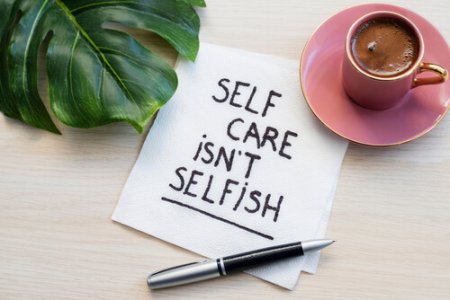Ask Joy: Caring For Yourself – The Importance of Self-Care
- Replies 3
Note from the Editor:
This article was kindly written for the SDC by retired psychologist/ member @Joy Straw.
Why is self-care so important?
Self-care is more than just important; it is the foundation of the mental, physical, and emotional well-being of yourself. If we don’t care for ourselves physically, we know we get sick. If we don’t care for ourselves emotionally or mentally, we can also get sick. Lack of mental care can lead to depression, anxiety and substance abuse. Not taking care of ourselves and overworking can lead to burnout. Taking care of ourselves should be a priority. This is not being selfish or self-centred; this is self-preservation.
When we’re flying, the safety demonstration points out that we must put an oxygen mask on ourselves before we help others. We are much more effective if we care for ourselves, and unfortunately, nobody is giving out medals for people who take care of themselves.
Why do we often fail to take care of ourselves?
We often allow stress at work to take over our lives, both work life and home life.
Technology is fantastic, but can be a cruel master if it takes over our lives. Even just a small reduction in the use of technology is proven to reduce stress and anxiety.
Guilt: Many of us remember that being told that putting ourselves first was considered a selfish thing. But research has proven that increased well-being and self-care enhance our mental, physical and emotional well-being.
Good Mental Health:
Regular exercise – Even simple walking or gentle exercise stimulates our immune system.
Eating well – Having healthy, regular meals and staying hydrated.
Sleep – There is a reason why sleep deprivation is used as a method of torture. Lack of sleep affects us mentally and physically and causes havoc with our emotions. Sleep regularly and deeply.
Relaxation – Studies have shown studying long hours into the night is much less productive than waking up early and feeling refreshed to study. Taking regular breaks between physical and mental work is far more productive.
Goals and priorities – Setting realistic goals and setting priorities helps for a healthier lifestyle.
Affirming positivity – Affirmation journals, or simply acknowledging and being grateful for the positive things in your life, can help stimulate a healthy mental attitude.
Stay connected – Isolation has been shown to be detrimental to mental health and physical well-being, especially during COVID-19.
Set boundaries and learn to say NO! – If this is a difficulty, please read my article on Setting Boundaries. This is essential to having a balanced lifestyle and reducing the chance of burnout
M.H.D or M.H.T. – Mental Health Days or Mental Health Trips. Some businesses include mental health days to help avoid burnout. You can use a trip to help encourage positive mental health and re-energise; even just the planning enhances well-being.
Guard ‘yourself time’ – It is important to respect yourself and guard the time you set aside for yourself.
Companionship animals – A pet is a great help in developing positive mental health. The research shows the benefit of caring for and owning a pet. They are frequently used as emotional support, as well as service animals.
Get organised – Mess and clutter around us can create a negative and confusing atmosphere in which to live and work, which in turn, affects our mental health.
Hobbies – Cooking, singing, embroidery and other activities that are pleasant to do can increase our well-being.
Good Physical Health:
Self-care – Healthy nutrition and the reduction of stress.
Exercise – Any movement is better than no movement. Start small and work up. A 10-minute walk one day can become a 15– 20 minute walk the next week.
Downtime – Reduce technology; turn off the phone. Determine which social demands are important and what’s not. Manage job stress by working in a more positive, less draining way.
Get outside – Aside from vitamin C, being outside reduces stress and increases life satisfaction.
— Credit: Psychology Today
Good Emotional Health:
Setting boundaries – Learning to say no is important for physical, mental and emotional health, reduces stress and anxiety and promotes resilience.
Focusing on positivity – Be thankful and grateful for what you have and what you’ve achieved.
Don’t beat yourself up – If you make a mistake, learn from it, and move on. It is good to reflect on the past dwelling in the past is emotionally draining and unhealthy.
Self-validation – Praise yourself or reward yourself for your achievements. Don’t wait for external validation. You are your greatest critic, so be your greatest cheer squad.
About the author: My name is Joy Straw, and I’ve been a counsellor and (now retired) psychologist working with couples and individuals, as well as children in crisis, for over 30 years. I am a widow with two children and three grandchildren and have recently moved to a retirement village and am loving life again.
Interested in reading more from Joy? You can find all her articles here.
Looking for immediate support? Here is a list of free mental health helplines.
You can ask Joy a question here.
Not a Rewards member yet? You can sign up for SDC Rewards today—it starts at under 14 cents per day.
This article was kindly written for the SDC by retired psychologist/ member @Joy Straw.
‘Happiness is not something readymade. It comes from your own actions.’ — Dalai Lama
Why is self-care so important?
Self-care is more than just important; it is the foundation of the mental, physical, and emotional well-being of yourself. If we don’t care for ourselves physically, we know we get sick. If we don’t care for ourselves emotionally or mentally, we can also get sick. Lack of mental care can lead to depression, anxiety and substance abuse. Not taking care of ourselves and overworking can lead to burnout. Taking care of ourselves should be a priority. This is not being selfish or self-centred; this is self-preservation.
When we’re flying, the safety demonstration points out that we must put an oxygen mask on ourselves before we help others. We are much more effective if we care for ourselves, and unfortunately, nobody is giving out medals for people who take care of themselves.
Why do we often fail to take care of ourselves?
We often allow stress at work to take over our lives, both work life and home life.
Technology is fantastic, but can be a cruel master if it takes over our lives. Even just a small reduction in the use of technology is proven to reduce stress and anxiety.
Guilt: Many of us remember that being told that putting ourselves first was considered a selfish thing. But research has proven that increased well-being and self-care enhance our mental, physical and emotional well-being.
Good Mental Health:
Regular exercise – Even simple walking or gentle exercise stimulates our immune system.
Eating well – Having healthy, regular meals and staying hydrated.
Sleep – There is a reason why sleep deprivation is used as a method of torture. Lack of sleep affects us mentally and physically and causes havoc with our emotions. Sleep regularly and deeply.
Relaxation – Studies have shown studying long hours into the night is much less productive than waking up early and feeling refreshed to study. Taking regular breaks between physical and mental work is far more productive.
Goals and priorities – Setting realistic goals and setting priorities helps for a healthier lifestyle.
Affirming positivity – Affirmation journals, or simply acknowledging and being grateful for the positive things in your life, can help stimulate a healthy mental attitude.
Stay connected – Isolation has been shown to be detrimental to mental health and physical well-being, especially during COVID-19.
Set boundaries and learn to say NO! – If this is a difficulty, please read my article on Setting Boundaries. This is essential to having a balanced lifestyle and reducing the chance of burnout
M.H.D or M.H.T. – Mental Health Days or Mental Health Trips. Some businesses include mental health days to help avoid burnout. You can use a trip to help encourage positive mental health and re-energise; even just the planning enhances well-being.
Guard ‘yourself time’ – It is important to respect yourself and guard the time you set aside for yourself.
Companionship animals – A pet is a great help in developing positive mental health. The research shows the benefit of caring for and owning a pet. They are frequently used as emotional support, as well as service animals.
Get organised – Mess and clutter around us can create a negative and confusing atmosphere in which to live and work, which in turn, affects our mental health.
Hobbies – Cooking, singing, embroidery and other activities that are pleasant to do can increase our well-being.
Good Physical Health:
Self-care – Healthy nutrition and the reduction of stress.
Exercise – Any movement is better than no movement. Start small and work up. A 10-minute walk one day can become a 15– 20 minute walk the next week.
Downtime – Reduce technology; turn off the phone. Determine which social demands are important and what’s not. Manage job stress by working in a more positive, less draining way.
Get outside – Aside from vitamin C, being outside reduces stress and increases life satisfaction.
— Credit: Psychology Today
Good Emotional Health:
Setting boundaries – Learning to say no is important for physical, mental and emotional health, reduces stress and anxiety and promotes resilience.
Focusing on positivity – Be thankful and grateful for what you have and what you’ve achieved.
Don’t beat yourself up – If you make a mistake, learn from it, and move on. It is good to reflect on the past dwelling in the past is emotionally draining and unhealthy.
Self-validation – Praise yourself or reward yourself for your achievements. Don’t wait for external validation. You are your greatest critic, so be your greatest cheer squad.
‘Joy is a net of love by which you can catch souls. A joyful heart is the inevitable result of a heart burning with love.’ — Mother Teresa
About the author: My name is Joy Straw, and I’ve been a counsellor and (now retired) psychologist working with couples and individuals, as well as children in crisis, for over 30 years. I am a widow with two children and three grandchildren and have recently moved to a retirement village and am loving life again.
Interested in reading more from Joy? You can find all her articles here.
Looking for immediate support? Here is a list of free mental health helplines.
You can ask Joy a question here.
Not a Rewards member yet? You can sign up for SDC Rewards today—it starts at under 14 cents per day.









